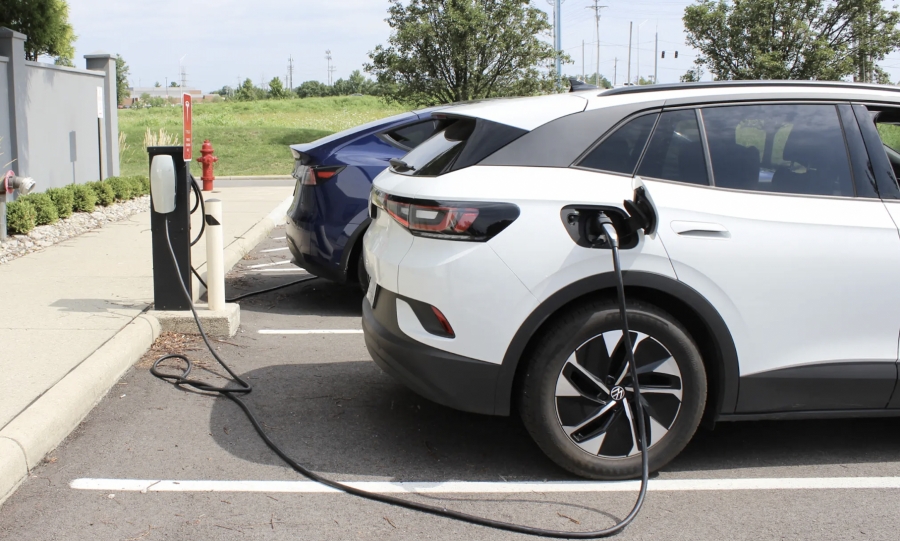The best EV charger for Teslas: Tesla Wall Connector
If you drive a Tesla, or you’re planning to get one, you should get a Tesla Wall Connector to charge it at home. It charges EVs (Teslas and otherwise) slightly faster than our top pick, and at this writing the Wall Connector costs $60 less. It’s small and sleek, weighs half as much as our top pick, and it has a long, slim cord. It also has one of the most elegant cord holders of any model in our testing pool. It’s not as weatherized as the Grizzl-E Classic, and it has no plug-in installation options. But if it didn’t require a third-party adapter to charge non-Tesla EVs, we might have been tempted to make it our overall top pick.
True to its amperage rating, the Wall Connector delivered 48 A when we used it to charge our rental Tesla, and it ticked up to 49 A when charging the Volkswagen. It brought the Tesla’s battery up from a 65% charge to 75% in just 30 minutes, and the Volkswagen’s in 45 minutes. This translates to a full charge in roughly 5 hours (for the Tesla) or 7.5 hours (for the Volkswagen).
Like the E Classic, the Wall Connector is UL-listed, showing that it meets national safety and compliance standards. It’s also backed by Tesla’s two-year warranty; this is a year shorter than United Chargers’ warranty, but it should still give you plenty of time to ascertain if the charger meets your needs, or if it has to be repaired or replaced.
Unlike the E Charger, which offers several installation options, the Wall Connector must be hardwired in (to make sure it’s installed safely and in accordance with electrical codes, we recommend hiring a certified electrician to do this). Hardwiring is arguably the best installation option anyway, though, so it’s an easy pill to swallow. If you prefer a plug-in option, or you don’t have the ability to permanently install a charger where you live, Tesla also makes a Mobile Connector with two interchangeable plugs: One goes into a standard 120 V outlet for trickle charging, and the other goes into a 240 V outlet for fast-charging up to 32 A.
Other than the Tesla Mobile Connector, the Wall Connector is the lightest model in our testing pool, weighing just 10 pounds (about as much as a metal folding chair). It has a sleek, streamlined shape and a super-slim profile—measuring just 4.3 inches deep—so even if your garage is tight on space, it’s easy to sneak past. Its 24-foot cord is on a par with that of our top pick in terms of length, but it’s even slimmer, measuring 2 inches around.
Instead of a wall-mountable cord holder (like the ones most models we tested have), the Wall Connector has a built-in notch that allows you to easily wind the cord around its body, as well as a small plug rest. It’s an elegant and practical solution to prevent the charging cord from being a trip hazard or leaving it at risk of getting run over.
Though the Wall Connector lacks the protective rubber plug cap, and it’s not completely impervious to dust and moisture like that model is, it’s still one of the most weatherized models we tested. Its IP55 rating indicates that it’s well protected against dust, dirt, and oils, as well as splashes and sprays of water. And like most chargers we tested, including the E Classic, the Wall Connector is rated for use in temperatures between -22° to 122° Fahrenheit.
When it arrived on our doorstep, the Wall Connector was carefully packaged, with little room left for it to knock about inside the box. This minimizes the likelihood of the charger getting battered or broken en route, necessitating a return or exchange (which, in these times of lengthy shipping delays, can be a major inconvenience).
How to charge most electric vehicles with a Tesla charger (and vice versa)
Just as you can’t charge an iPhone with a USB-C cable or an Android phone with a Lightning cable, not every EV can be charged by every EV charger. In rare cases, if the charger you want to use is incompatible with your EV, you’re out of luck: For example, if you drive a Chevy Bolt, and the only charging station along your route is a Tesla Supercharger, no adapter in the world will allow you to use it. But in most instances, there’s an adapter that can help (as long as you have the right one, and you remember to pack it).
Tesla to J1772 Charging Adapter (48 A) allows non-Tesla EV drivers to juice up from most Tesla chargers, which is helpful if your non-Tesla EV battery is running low and a Tesla charging station is the closest option, or if you spend a lot of time at a Tesla owner’s home and want the option to top off your battery with their charger. This adapter is small and compact, and in our testing it supported up to 49 A charging speeds, slightly exceeding its 48 A rating. It has an IP54 weatherproof rating, which means it’s highly protected against airborne dust and moderately protected against splashing or falling water. When you’re connecting it to a Tesla charging plug, it makes a satisfying click when it snaps into place, and a simple press of a button releases it from the plug after charging. It’s also UL-listed and has a one-year warranty.Tesla’s J1772-to-Tesla adapter is rated to support up to 80 A of current, and it’s included for free with the purchase of any Tesla vehicle.
Post time: Oct-26-2023

 Portable EV Charger
Portable EV Charger Home EV Wallbox
Home EV Wallbox DC Charger Station
DC Charger Station EV Charging Module
EV Charging Module NACS&CCS1&CCS2
NACS&CCS1&CCS2 EV Accessories
EV Accessories

